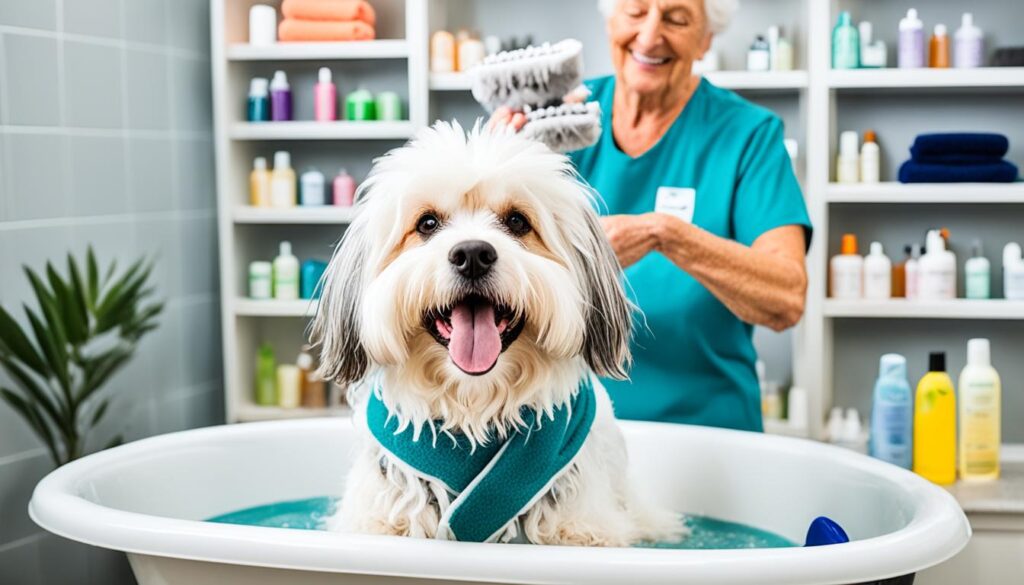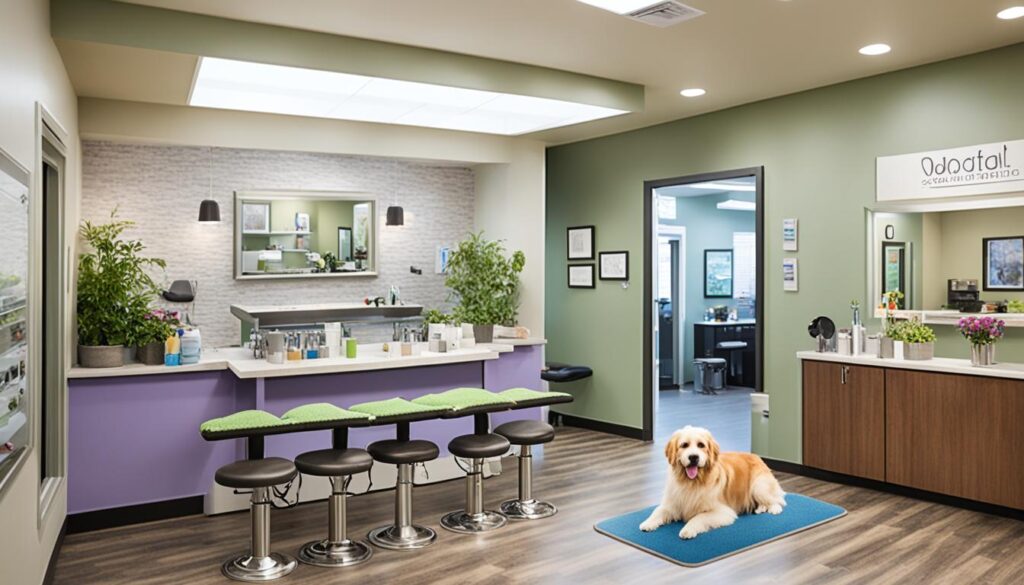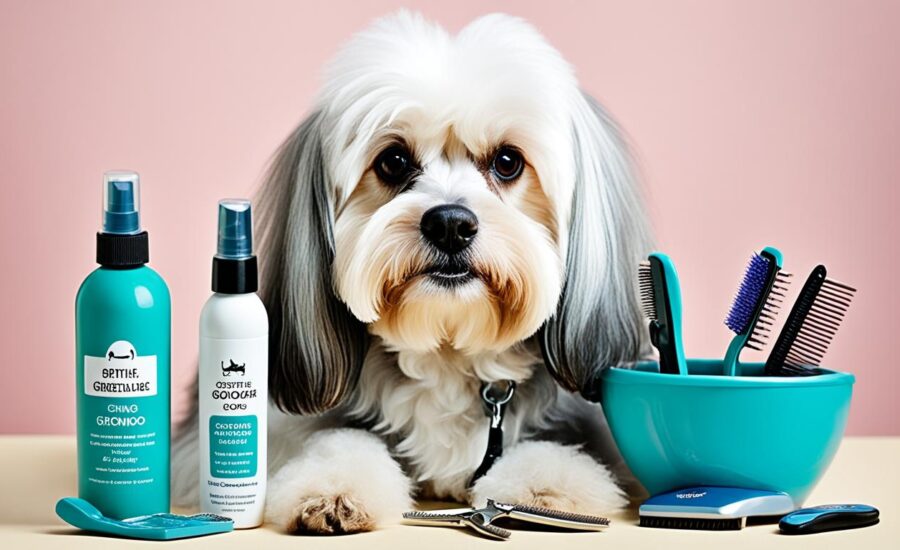When our pets grow old, they need us more than before, especially for grooming. Grooming an older pet isn’t just for looks. It’s crucial for their health and happiness. Keeping this in mind, let’s explore why grooming is so important for senior pet health. We’ll see how the right care can make their golden years even brighter.
Key Takeaways
- Understanding the unique grooming needs of senior pets is vital for maintaining their overall health.
- Adapting your grooming techniques can greatly improve the comfort level and well-being of aging companions.
- Regular grooming routines serve as health checks that can detect early signs of potential medical issues.
- Creating a safe, stress-free grooming environment is key to a positive experience for senior pets.
- Employing gentle approaches during grooming sessions is essential for pets with increased skin sensitivity and health considerations.
Understanding the Unique Needs of Aging Companions
When pets get older, grooming them becomes even more crucial. It’s not just about keeping them looking good. It’s about their health and comfort too. Grooming for older pets must be done with more care. Owners need to know the best practices for grooming older pets to give the best care.
Adapting to Physical Changes in Senior Pets
Senior pets change a lot as they age. Their coat can get thicker or thinner, leading to more tangles. They may also become more sensitive. It’s important to be patient and gentle during grooming. Using softer brushes and setting a regular grooming schedule are part of the best practices for grooming older pets.
Recognizing Signs of Discomfort and Pain
Noticing if your pet is in pain while being groomed is crucial. Older pets might not show they’re hurting the same way younger ones do. Watch for signs like pulling away or getting upset easily. Being gentle is very important. It makes grooming less stressful for them.
Weight and Mobility Considerations During Grooming
As pets age, they might not move as well. They might also gain or lose weight. While grooming, you might need to help them stand or take more breaks. Making sure the grooming area is safe and perhaps grooming at home can help. This shows you understand the importance of grooming senior pets and want to make it easier for them.
| Grooming Needs | Young Pets | Senior Pets |
|---|---|---|
| Brush Type | Firm bristles | Soft bristles |
| Grooming Frequency | Depends on breed and coat | More frequent to monitor health |
| Support Needs | Minimal | Increased; non-slip surfaces and breaks |
| Response to Discomfort | May vocalize | Subtle signals |
Proper grooming helps keep your older pet healthy and looking good. More importantly, it shows how much you love and care for them in their later years.
The Importance of Regular Grooming for Older Pets
Grooming gets more important as cats and dogs get older. Grooming senior cats and dogs helps keep an eye on and boost their health. Caregivers can spot health issues and keep their furry friends feeling good with gentle senior pet grooming techniques.
Grooming senior cats and dogs helps find health problems early. Owners can notice changes like new bumps or skin issues. This makes grooming a way to watch for health issues, keeping pets from getting sick.

Gentle brushing promotes blood flow, leading to better skin and coat. Grooming also stops painful matting and helps older pets move easier. This is crucial as senior pets often move less.
Grooming considers senior pet health during grooming, like keeping them at the right temperature and dental care. Grooming times also strengthen the bond between pet and owner. They offer comfort, especially to pets with declining mental health.
Regular grooming brings many advantages. It’s about health, spotting problems early, and deepening pet-owner bonds. Consistent grooming keeps older pets healthy and happy.
Creating a Safe Grooming Environment
Caring for senior pets means setting up a calm grooming space. It’s vital for their comfort and safety. With the right equipment and a well-adjusted area, we create a caring spot for grooming senior cats and dogs. Ensuring their health during grooming is key. We do this by using gentle methods to keep stress low.
Choosing the Right Grooming Equipment
Choosing the right tools is key for older pets’ grooming. Soft brushes and shampoos for sensitive skin are important. They are essential senior pet grooming techniques to keep them healthy and happy.
Assessing the Grooming Space for Safety
Creating a safe grooming spot means more than comfort. It’s about avoiding injuries. We arrange a space with non-slip mats and padded areas. This helps pets with arthritis or mobility issues stay safe.

Minimizing Stress with Soothing Techniques
To support aging pets emotionally during grooming, we use calming methods. A gentle voice and breaks for rest help. Rewards also make the grooming a happy time for pets and their owners.
| Equipment | Feature | Benefit |
|---|---|---|
| Soft Bristle Brush | Gentle on skin | Prevents irritation |
| Non-Slip Mat | Provides stability | Reduces risk of falls |
| Orthopedic Bed | Soft cushioning | Comfort during breaks |
| Gentle Shampoo | Formulated for sensitive skin | Promotes coat and skin health |
Grooming Senior Pets: What You Need to Know
When it comes to senior pet grooming, it’s key to understand what the animal needs. Older pets get stressed more easily. This can make grooming hard for them. Owners need to watch their pets closely during grooming. This helps keep both the pet and the groomer happy and stress-free.
What you need to know about grooming older pets also includes knowing their health limits. For example, older dogs often have weaker hearts. It’s important not to stress them, especially not around their necks. Many groomers suggest using a harness instead of a collar to avoid risk.
If a pet is really scared of grooming, a vet might suggest sedation. But, this is only in special cases. Choosing groomers who know how to handle older pets is crucial. They can tailor their approach. This ensures the pet’s health and happiness are always the main concern.
| Grooming Consideration | Importance for Senior Pets | Action Steps |
|---|---|---|
| Gentle Handling | Reduces stress and accommodates physical sensitivities. | Use a soothing tone, offer treats, and take breaks as needed. |
| Health Monitoring | Allows for early detection of health issues. | Examine the pet for any lumps, soreness, or irregularities during grooming. |
| Comfortable Environment | Prevents injury and promotes calmness. | Ensure non-slip surfaces and a quiet area for grooming. |
| Specialized Equipment | Addresses the pet’s specific grooming needs. | Select soft brushes and accessories designed for senior pets. |
In summary, grooming senior pets requires special care. Every step should focus on the pet’s comfort and safety. That’s why grooming tips for aging pets are so valuable. They help keep older pets clean and happy.
Senior Pet Grooming Techniques: Gentle Approaches
Grooming senior pets needs a gentle touch. This is vital for their health while being groomed. Older pets have special needs that must be met with care. We’re going to look at how to care for your elderly companion in a way that avoids stress.
Effective Brushing for Sensitive Skin
As pets grow older, their skin gets more sensitive. Using softer brushes can ease their discomfort. It’s important to brush gently and avoid pulling their fur. This matches the best practices for grooming older pets.
Bathing Tips for Senior Dogs and Cats
A bath for an older pet should be calming, with warm water to keep stress low. Use shampoos made for sensitive skin, and make sure no soap is left on their skin. They should stand on a comfy mat and be dried well to avoid being cold.
Nail Trimming Without Causing Anxiety
Trimming a senior pet’s nails can be stressful if not done carefully. Always use tools made for older pets and don’t cut too close to avoid pain. It’s good to trim their nails often to keep them at a comfortable length.
| Technique | Importance | Tools | Tips |
|---|---|---|---|
| Brushing | Reduces matting and skin irritations | Soft bristle brush | Brush gently, follow the coat’s natural direction |
| Bathing | Essential for hygiene and skin health | Shampoo for sensitive skin | Use lukewarm water and avoid the face |
| Nail Trimming | Prevents overgrowth and mobility issues | Senior-appropriate nail clippers | Trim frequently, avoid the quick |
With these senior pet grooming techniques, your aging pet can stay comfy and healthy. Remember to groom with patience and empathy. It’s important to understand the changes your senior pet faces.
Best Practices for Managing Senior Pet Health During Grooming
Pet care for older animals is crucial, especially during grooming. It helps keep them healthy and happy. Watching for signs of arthritis is important. Adjust the grooming to ease their discomfort. Use orthopedic mats or towels for their comfort while grooming. Choose gentle products for their skin and coat.
Don’t forget their internal health too. Dental care is key to prevent serious problems. Brush their teeth or provide dental treats. Keep grooming sessions stress-free to protect their mental well-being. Use a calm voice and allow breaks.
A holistic approach to senior pet health during grooming is vital. This includes monitoring their diet and ensuring they exercise. Also, don’t skip vet checkups. Make their living space safe and comfortable. This care will keep your pet happy, clean, and engaged as they age.
FAQ
What are the key aspects of grooming senior pets?
How do the physical changes in senior pets affect their grooming needs?
What are the signs of discomfort and pain to look out for during grooming?
How should weight and mobility be considered when grooming older pets?
Why is regular grooming important for senior cats and dogs?
How can I create a safe grooming environment for my senior pet?
What should I know before grooming my senior pet?
What are some gentle grooming techniques for senior pets?
How can I manage my senior pet’s health during grooming?
Are there any specific grooming products I should use for my senior pet?
Source Links
- https://brooklynpetspa.com/8-essential-things-to-note-about-grooming-senior-dogs/
- https://medium.com/@johnsnowoa/grooming-tips-for-senior-pets-special-considerations-for-aging-fur-friends-fccc94cbe562
- https://www.dutch.com/blogs/dogs/grooming-senior-dogs

